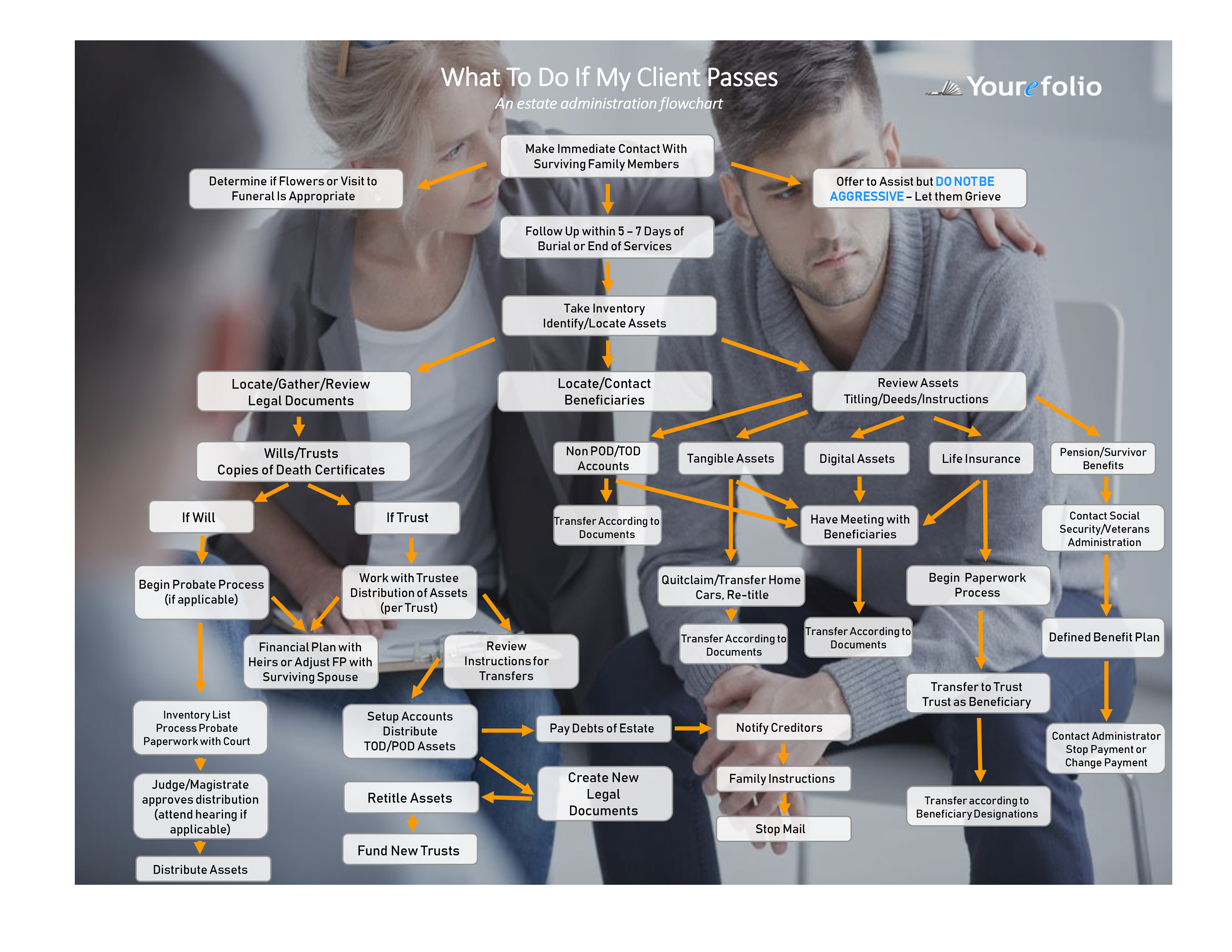
By the Yourefolio Staff
Death is a terrible occurrence which also incurs a lot of emotion. Having to sort out the debt of the deceased only amplifies the moment. This is especially true when the debt outweighs the assets, or when a client is unsure if they are responsible for the debt. Luckily, we can provide some simple guidance on debt and what your clients can do when the debt collectors come calling. It is important to remember that once assets from an estate are exhausted, the beneficiaries or relatives are typically not responsible for any remaining debt of a deceased relative.
In cases of a surviving spouse, if the married couple kept separate bank accounts and credit cards, but filed joint tax returns, the surviving spouse is not likely to be personally liable for the late spouse’s debt. The executor should be made aware of the debts and can inquire whether the surviving spouse is responsible or not. Executors should not avoid the debt holders, but rather make sure they communicate and understand the source of the debt. When an estate doesn’t have sufficient assets to pay all debts in full, the debts are prioritized.
When prioritizing debt, it will most likely start funeral expenses and expenses related to the settlement of the estate. Surviving spouses can be reimbursed under certain situations if they have prepaid funeral expenses. Surviving spouses can also be reimbursed for the cost of probating the will and any costs related to the administration of the estate (i.e. legal fees). The estate would then pay taxes and other debts according to State and/or Federal laws.
The executor should attempt to pay each debt in full prior to moving to the next debt holder. If there’s not enough money to pay everyone in full, the creditors would be paid proportionally. If the money runs out, there is nothing left to pay the credit card bills. Creditors must submit their proof of claim within a specified time period. Executors of the estate can disagree with an amount claimed, but the creditor must be informed.
The last thing grieving family members want are calls from debt collectors demanding payment of a loved one's outstanding debts. According to the Federal Trade Commission (FTC), relatives usually have no legal obligation to pay the debts of a family member who has died. The rights of surviving relatives are covered by the Fair Debt Collection Practices Act (FDCPA), which prohibits debt collectors from using abusive, unfair, or deceptive practices to collect from family members.
Basically, if there isn't enough in the estate to cover outstanding debts, they typically go unpaid. Even a spouse's obligation to pay may be limited under state probate law. Generally, children won't have to pay these debts either, but they could see their inheritance reduced as assets are depleted to cover debts. Avoid the attachment of pension or IRA’s by creditors to cover debts by listing children as beneficiaries to these items.
Unpaid medical bills vary by state. In some states, medical bills must be paid by any assets contained in the estate, but are not the responsibility of children or family members. However, other states have instituted laws that require children to pay some part of their parent's unpaid medical bills, if there are insufficient funds in the estate.
Mortgage balances aren’t wiped out if the home is left to relatives. Those who will inherit the property will be responsible for making monthly payments. However, the mortgage lender typically can't require immediately payment of the entire mortgage. If the house is sold and it is discovered that the sales price does not cover the balance of the mortgage, the beneficiaries won’t be forced to pay any amount not covered by the sale. The bank can act as a creditor and lay claim to assets within the estate to pay off the balance.
There may be some minor exceptions, such as children who cosigned to a parent's loan, or those in which the parent(s) transfer property to the children shortly before their death, and that transfer is deemed an attempt to defraud creditors. Under these circumstances, children could be held responsible for a deceased parent's unpaid medical bills. Otherwise creditors can come after the assets within the estate, but not the assets of children. If the estate has insufficient assets, then the debt is typically written off by the debt holder.
It is important to understand debt when estate planning. While knowing exact debt balances isn’t a priority, understanding what can be collected from the estate and how the inheritance is affected should be a priority. Little planning goes into analyzing how debt will be handled, but understanding monetary needs of the beneficiaries should be taken into consideration. Income replacement may need consideration when debt is greater than the assets. Consult an attorney for the exact legal ramifications of an estate with debt.



